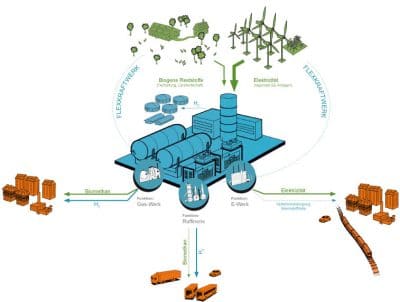With passing the climate action plan, the German government has set clear, unequivocal targets: By 2050, the entire transportation sector is to produce zero CO2 emissions, and a 40 per cent reduction compared to the baseline year of 1990 is to be achieved by as early as 2030. A hydrogen economy is one way to approach this social project, but it will require cooperation among all of society’s members – citizens, citizen advocacy groups, associations, businesses, politicians and researchers – to make it a success.
Hydrogen and fuel cells could become key technologies in a post-fossil fuel, sector-integrated energy industry, whether they would be used to store renewable energies, supply low-emission heat or maintain sustainability in transportation. Establishing a hydrogen economy will ultimately rely on H2 production from renewables to create a zero-emission energy infrastructure.
…
Enjoy broad support
From 2014 through 2016, HyTrustPlus – Hydrogen Economy as a Social Project identified and analyzed plans, processes, ideas and opinions of many stakeholders that could contribute to the establishment of said economy. The study shows that
…
Instigate cooperation
The positive attitude towards (acceptance of) hydrogen use in transportation had already become clear during the previous HyTrust project and could be confirmed during HyTrustPlus for hydrogen and fuel cell use even if several industries are involved. This level of acceptance is perceived as a prerequisite for active support of innovation and the transformation process that comes with it.
Still, there would need to be more options to expose people to these technologies and see hydrogen used in day-to-day operations. Turning people who are sympathetic to the cause into full-fledged supporters will require that products and the related infrastructure become more visible to the public.
…
Another challenge that remains is the cooperation of stakeholders from different sectors. Experiences gathered during regional dialogs paint a first picture of how to incorporate hydrogen into local transformation projects.
Strengthen the regional H2 economy
One has yet to create a template for a successful business model of a hydrogen economy. There are indeed regions with a definite interest in integrating hydrogen into their renewable energy infrastructure, but they lack the knowledge and the professional support for implementing their ideas.
…
The hydrogen economy could assume a key role particularly in energy and transportation if lobbying concentrated more on a compelling overarching storyline. As shown by the Steinfurt approach, the story would need to be about how challenges are solved and not stay focused on describing technical properties. The current debates must become more open to other interested parties and involve new stakeholders. From a user’s point of view, expectations are that there will be more H2 vehicle offerings to come, a sufficient number of German models among them. Stringent, obligatory CO2 emission limits promise to increase the willingness to invest in sustainable products. Additionally, there needs to be an expansion of the hydrogen infrastructure in transportation.
Be clear about the benefits
…
Implementing a plan for the integration of hydrogen across sectors will require government risk sharing and political and legal planning security. So far, large investments in hydrogen technology have been hardly justifiable considering the unknown risks inherent in currently oft-insufficient output, a lack of value chains and continually changing regulations.
Grow visibility
Many people in Germany have been made insufficiently aware of hydrogen and fuel cells and the activities of the hydrogen community. The current political, legal and regulatory environment and today’s cost structures are perceived as barriers to the establishment of a hydrogen economy. At present, the revised renewable heating law does not include any incentives for energy producers to use hydrogen storage. On the contrary, electrolyzers are classified as end consumers, meaning that EEG surcharges, energy taxes and other fees must be paid to produce hydrogen and later convert it back into electricity. However, it will need all kinds of alternative technological and organizational options to create an integrated and renewable energy infrastructure and move Germany’s energy transformation forward.
Authors: Professor Dr. Andreas Knie, Anke Schmidt, Julia Epp



























It is already clear to everybody that these targets
of the German Government, will NOT be reached
Quote:
“…By 2050, the entire transportation sector is to produce
zero CO2 emissions, and a 40 per cent reduction compared
to the baseline year of 1990 is to be achieved by as early as 2030…”
As today, and we write 2017, the C02 and other GHGs pollution values
are going up and not down, despite all governmental and institutional blah blah.
See more here:
https://www.youtube.com/watch?v=Tk7B8wpr6qg